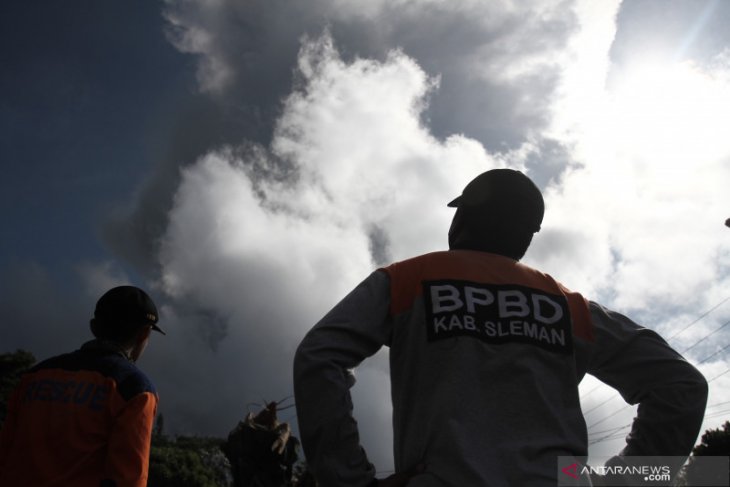Live Streaming
Program Highlight
Company Profile
June
Solar Eclipse, Ministry of Religious Affairs Urges Muslims to Perform Kusuf Prayer
Written by Ani HasanahDirector General of Islamic Community Guidance of the Ministry of Religion Kamaruddin Amin
The natural phenomenon an annular solar eclipse occur in most parts of the Indonesian archipelago this Sunday, June 21 .
Based on astronomical data, there are 31 provinces in Indonesia that can observe this rare phenomenon, as the last similar eclipse that could be witnessed from the archipelago occurred in 1648.
The Director General of Islamic Community Guidance of the Ministry of Religion Kamaruddin Amin in Jakarta, Saturday, June 20 urge to Muslims whose regions experienced an eclipse and were safe in COVID-19 to perform the solar eclipse prayer or Kusuf prayer and follow the health protocol.
According to Kamaruddin, the timetable of Kusuf prayerdepends of the time of the solar eclipse in each region. (Rilis Kemenag/trans by PUTRI).
June
Indonesia Challenged to Achieve its Mandated Food Security: Economist
Written by Ani Hasanah
Rizal E Halim, an economist of the University of Indonesia's Faculty of Economics and Business (ANTARA/Special)
Indonesia has had the 2012 Food Law that mandates the country to possess a roadmap to achieve an overall food security; however, it remains challenged by various food-related issues, including repeated price hike and shortage of stocks, an economist said.
"Food remains a chronic problem in certain time due to the fact that our national food management is not yet good," said Rizal E Halim, an economist of the University of Indonesia's Faculty of Economics and Business, here Sunday.
The food-related issues should be resolved by achieving the mandated food security goal, and improving the integration of food management because the food problems are not just handled by the ministry of agriculture but also by other ministries and agencies.
Halim argued that Indonesia's food management still faces such challenges as the national food supplies that remain dominated by imported products; unresolved rent seeking activities; and lack of uses of food technology and innovation.
The Indonesian Government is indeed aware of the importance of improving the nation's food security amid this ongoing global pandemic of novel coronavirus disease (COVID-19) and beyond.
On April 21, 2020, President Joko Widodo (Jokowi) had asked officials to ensure that their assessment of Indonesia's rice stocks was accurate.
The President's directive came on the back of a warning issued by the Food and Agriculture Organization (FAO) of the United Nations, which had predicted the COVID-19 pandemic could trigger a global food crisis.
"Make sure that our rice stocks are sufficient. Please, calculate them accurately. Also, make a precise prediction of our rice production as we are entering the dry season. How long will our national rice reserves last?" he told a video conference recently.
President Jokowi requested the authorities to calculate the national rice stocks by referring to valid and reliable empirical data.
He also reiterated FAO's warning that the current coronavirus pandemic could trigger a food shortage across the world.
Indonesia needs to be cautious because all countries, including rice producers, would prioritize their domestic needs, he said, adding that the imposition of a lockdown could affect the staple food supply chain.
In connection with the impact of COVID-19 on global food security, the Food and Agriculture Organization had earlier warned of a looming food crisis.
However, this worst-case scenario could be avoided if "measures are taken fast to protect the most vulnerable, keep global food supply chains alive, and mitigate the pandemic's impacts across the food system", according to the FAO.
The FAO, on its official website, expressed the opinion that "border closures, quarantines, and market, supply chain, and trade disruptions could restrict people's access to sufficient/diverse and nutritious sources of food". (ANTARA)
June
Ministry Develops Aquaculture Micro Insurance for Fish Farmers
Written by Ani Hasanah
Director General of Aquaculture of the Marine Affairs and Fisheries Ministry Slamet Soebjakto. ANTARA/M Razi Rahman/
The Marine Affairs and Fisheries Ministry has developed aquaculture micro insurance for fish farmers to minimize the risk of aquaculture businesses.
"The protection scheme for fish farming under the aquaculture micro insurance in Indonesia will be expanded next year, not only for fresh water and brackish water fish farming, but also for ocean fish farming," the ministry's Director General of Aquaculture Slamet Soebjakto said in a statement in Jakarta on Sunday.
Some commodities are recommended to be covered by aquaculture insurance in 2021, including sea weeds, grouper fish, star pomfret, and white snapper.
The government has taken measures to improve fish farmers' welfare, among others by minimizing the risk of aquaculture business due to natural disaster and fish diseases, provision of insurance for aquaculture.
Soebjakto said, aquaculture insurance has become the ministry's concrete action to protect fish farmers, as stipulated in the law no. 7/2016 on the protection and empowerment of fishermen, fish and salt farmers.
"With this aquaculture insurance, farmers would run their business more comfortably and easier to get access to funding for business expansion, hence fish farmers could increase productivity," he added.
Since 2017 the government has disbursed aid for small-scale fish farmers through payment of premium for small-scale fish farmers insurance (APPIK), to ensure continuity of the business when it was hit by natural disaster or fish disease.
As of 2019, the government has paid the insurance premium for 15,026 fish farmers in 25 provinces, covering some 20,836 hectares of ponds for shrimp, milkfish, tilapia, and catfish, using simple technology of monoculture and polyculture.
The APPIK program is targeted to cover five thousand hectares of land in 2020 with more farmers could enjoy the benefit. (ANTARA)
June
Indonesia's Mount Merapi Erupts Twice on Sunday
Written by Ani Hasanah The Mount Merapi on the border of Yogyakarta's Sleman District and Central Java Province erupted twice on Sunday morning (June 21, 2020) producing a 6,000-meter-high ash column. ANTARA FOTO/Hendra Nurdiyansyah/foc.
The Mount Merapi on the border of Yogyakarta's Sleman District and Central Java Province erupted twice on Sunday morning (June 21, 2020) producing a 6,000-meter-high ash column. ANTARA FOTO/Hendra Nurdiyansyah/foc.
The Mount Merapi on the border of Yogyakarta's Sleman District and Central Java Province erupted twice on Sunday morning producing a 6,000-meter-high ash column.
The first eruption occurred at 09.13 a.m. local time while the second one took place at around 09.27 a.m. local time, Head of the Sleman District Disaster Mitigation Agency (BPBD) Makwan said in Sleman, Yogyakarta, Sunday.
The height of the first eruption's ash column was estimated at 6,000 meters from Mount Merapi's peak while its amplitude was recorded at 75 millimeters, he said, adding that the wind moved towards the west when the eruption occurred.
The two eruptions did not bring any ash rain down, and the situation remained secure in Glagaharjo Village, Cangkringan Subdistrict, Sleman District, Yogyakarta Province, following the eruptions, he said.
The Mt Merapi's warning status has been declared "caution" since May 21, 2018. Local residents are suggested to remain calm but stay alert with the three-kilometer-safe distance.
This 2,930-meter-high volcano has repeatedly erupted over the past two years. On March 3, 2020, for instance, it erupted.
As a result of its eruption on that day, Directorate General of Civil Aviation of the Ministry of Transportation temporarily shut down the Adi Sumarmo International Airport in Solo, Central Java.
AirNav Indonesia issued Ashtam Number VAWR 9293 and a notice to airman concerning the airport's temporary closure to offer guidance to pilots passing through the eruption area of Mount Merapi. (ANTARA)


